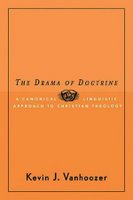Are you a theologian?
 I have been pretty busy lately and have not been able to do as much reading as I would like in my new book by Kevin Vanhoozer, The Drama of Doctrine. Yesterday, though, I came across a quote that I would like to share concerning the role of a theologian.
I have been pretty busy lately and have not been able to do as much reading as I would like in my new book by Kevin Vanhoozer, The Drama of Doctrine. Yesterday, though, I came across a quote that I would like to share concerning the role of a theologian.The primary role of the theologian is to bear witness, in word and deed, to the meaning and significance of God’s communicative action in Jesus Christ, in order to enable others to understand and participate in it too. (Vanhoozer, p. 58)
I like this definition because it turns everyone into a theologian. We are not all called to write systematic theologies, but we are all called to “bare witness in word and deed” to what God has revealed to us through the person, work, and words of Christ. And if that is the case, what Vanhoozer says on the very next page becomes very relevant:
This gives rise to yet another dimension to the drama of doctrine: Will we speak and act according to the Scriptures and contribute to the development of the theo-dramatic plot, or will we follow some other, more culturally fashionable story lines?(Vanhoozer, p. 59)
Don’t worry if you don’t know what he means by “theo-dramatic.” The force of what he is saying is clear enough. We are either going to follow the way of Scripture or some other way that ruffles less feathers. There is a choice here but there is also an issue of know-how. Vanhoozer puts it this way, “Theological competence is ultimately a matter of being able to make judgments that display the mind of Christ (p. 2).” Such ability, according to Hebrews 5:13-14, is only for those skilled in the word of righteousness, for those who have had their powers of discernment trained by constant practice to distinguish good from evil.
We should not settle for what amounts to immaturity in the Christian life (Heb. 5:13). Instead, we should strive to be the best theologians possible, not so that we can write a book but so that we can live a life that is to the praise of His glory.
